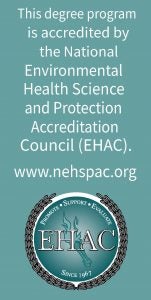MS Environmental Health
Do you have an undergraduate degree in environmental health science or a related field and want to improve your knowledge, skills and career prospects? Are you currently an environmental health professional and want to upgrade your credentials and improve your professional prospects while continuing to work?
The Master of Science in environmental health (MSEH) program at East Carolina University is a great opportunity for students seeking rewarding career opportunities while protecting the environment and public health. The MSEH program also provides current environmental health professionals an opportunity to upgrade their credentials and improve their career prospects. Graduates from the program will be prepared for the challenges and opportunities available with local, state, federal and international organizations and agencies. Topics of study include air pollution control, elements of environmental engineering, water supply and wastewater technologies, food safety, toxicology, epidemiology, industrial hygiene, occupational health, vector-borne disease and environmental law and management.
Prospects for employment and career advancement are excellent. The U.S. Bureau of Labor Statistics predicts that the employment opportunities in environmental health sciences will expand by 28% in the next decade. Both public- and private-sector employers seek trained environmental health professionals for a wide variety of important jobs. In addition to local, state and federal public health agencies, other potential employers include military installations, industry, consulting firms and institutional environments. Graduates also may choose to pursue a career in environmental health research and/or pursue a doctorate in a related field of interest.
Click here to learn more about the ECU Environmental Health Science Blog.
Admission Requirements
Completion of an appropriate undergraduate degree is required for admission to the MSEH Program. No GRE is required for the MSEH. Traditionally, successful MSEH applicants have earned an undergraduate Grade Point Average (GPA) of 2.7 or above (graduate GPA of 3.0 or above). However, admission to the MSEH Program is based upon a holistic review of several factors, which may include (in addition to GPA) letters of recommendation, previous education, work experience in EH or related field and/or other factors, as appropriate. MSEH applicants are encouraged to e-mail the Graduate Program Director, Dr. Stephanie Richards (richardss@ecu.edu), for more information related to their specific application.
An application is required for admission to the MS graduate program – please visit the ECU Graduate School site for details or click Apply Button below.
Program Requirements
The master of science in environmental health requires completion of a minimum of 35 s.h. A student with less than 30 undergraduate semester hours in the natural sciences may be admitted with the approval of the environmental health sciences faculty and may be required to complete additional science coursework. All students must pass a written, comprehensive examination typically completed during the student’s last semester prior to graduation.
Environmental health offers two degree paths:
- Research Option: Students must complete and submit a thesis to both the thesis committee and the Graduate School for review. The thesis option may require more intensive and/or additional hands-on data collection and typically requires students to complete more face-to-face courses.
- Applied Option: This option is intended for students with previous education and/or experience in environmental health or a closely related discipline. Permission to choose this option must be obtained from the environmental health sciences program faculty. Students must complete and submit a professional paper to their professional paper committee for review. This degree option may be completed entirely online with the approval of the environmental health sciences program faculty.
Delivery Methods
This program is offered in both an on campus, face-to-face format and off campus, online format.
Additional Information
Environmental Health Foundations Certificate
Accreditation Information
The MS in environmental health is accredited by National Environmental Health Science and Protection Accreditation Council (EHAC), the National Environmental Health Science and Protection Accreditation Council (EHAC).


Institutional and Professional Licensure Disclosures for Enrolled and Prospective Students
ECU degree programs satisfy the professional licensure and/or certification requirements in North Carolina and prepare students to sit for these exams. However, requirements in other states may be different.
If you are considering a degree program that may, would, could or potentially lead to a professional license and/or certification, please note that at this time ECU may or may not be able to advise whether a program meets requirements outside of North Carolina. Prior to enrolling in a degree program, please discuss this important topic with your program of interest.
